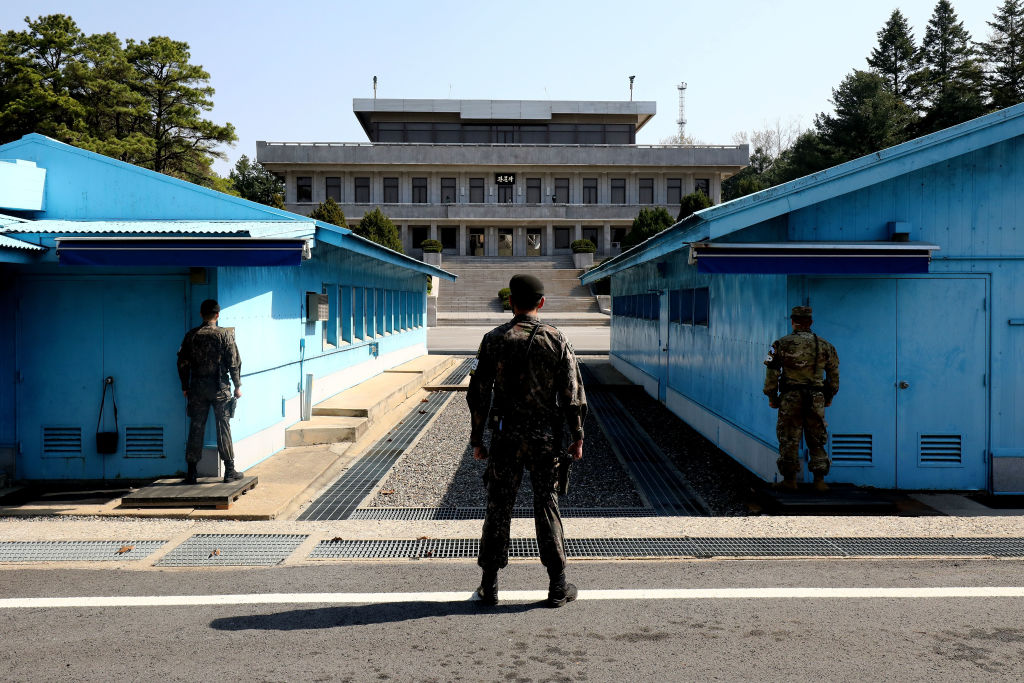South Korea confirms talks with North Korea and the U.S. to finally end the Korean War


A free daily email with the biggest news stories of the day – and the best features from TheWeek.com
You are now subscribed
Your newsletter sign-up was successful
On Wednesday, South Korea confirmed that it has been in talks with the U.S. and North Korea about negotiating a treaty to formally end the Korean War, which stopped in 1953 with an armistice signed by America, China, and North Korea. South Korean national security adviser Chung Eui-yong said that he, U.S. National Security Adviser John Bolton, and other Trump administration officials "held in-depth discussions" last week in Washington "on various ways of how to end hostilities and eventually establish a peace regime on the Korean Peninsula."
North Korean leader Kim Jong Un and South Korean President Moon Jae-in are meeting in the demilitarized zone (DMZ) on April 29, and President Trump confirmed Wednesday that he sent CIA Director Mike Pompeo to meet with Kim earlier this month to help lay the groundwork for a Trump-Kim summit in late May or June. On Tuesday, Trump said Kim and Moon "have my blessing to discuss the end of the war."
Negotiating a formal peace treaty would require the participation of China and the U.S. as well as the Koreas. A spokeswoman for China's Foreign Ministry said Wednesday that "China's attitude is open and supportive to any peaceful means to resolve the Korean Peninsula issue through consultations," but Cheng Xiaohe, a North Korea expert at Beijing's Renmin University, told The New York Times that Trump's hard line on trade "is complicating and undermining cooperation." If the U.S. wants to sign a treaty with Pyongyang, "it has to talk to China, and the United States has to recognize North Korea diplomatically," Cheng added. "A treaty is not a memorandum or a communiqué."
The Week
Escape your echo chamber. Get the facts behind the news, plus analysis from multiple perspectives.

Sign up for The Week's Free Newsletters
From our morning news briefing to a weekly Good News Newsletter, get the best of The Week delivered directly to your inbox.
From our morning news briefing to a weekly Good News Newsletter, get the best of The Week delivered directly to your inbox.
It's an open question what Pyongyang would give up or demand in the treaty — a withdrawal of America's 28,500 troops from South Korea would probably be a nonstarter, for example, but a reduction might align with Trump's goals and China's. You can read more about the sticking points at The New York Times.
A free daily email with the biggest news stories of the day – and the best features from TheWeek.com
Peter has worked as a news and culture writer and editor at The Week since the site's launch in 2008. He covers politics, world affairs, religion and cultural currents. His journalism career began as a copy editor at a financial newswire and has included editorial positions at The New York Times Magazine, Facts on File, and Oregon State University.
-
 The broken water companies failing England and Wales
The broken water companies failing England and WalesExplainer With rising bills, deteriorating river health and a lack of investment, regulators face an uphill battle to stabilise the industry
-
 A thrilling foodie city in northern Japan
A thrilling foodie city in northern JapanThe Week Recommends The food scene here is ‘unspoilt’ and ‘fun’
-
 Are AI bots conspiring against us?
Are AI bots conspiring against us?Talking Point Moltbook, the AI social network where humans are banned, may be the tip of the iceberg
-
 Nobody seems surprised Wagner's Prigozhin died under suspicious circumstances
Nobody seems surprised Wagner's Prigozhin died under suspicious circumstancesSpeed Read
-
 Western mountain climbers allegedly left Pakistani porter to die on K2
Western mountain climbers allegedly left Pakistani porter to die on K2Speed Read
-
 'Circular saw blades' divide controversial Rio Grande buoys installed by Texas governor
'Circular saw blades' divide controversial Rio Grande buoys installed by Texas governorSpeed Read
-
 Los Angeles city workers stage 1-day walkout over labor conditions
Los Angeles city workers stage 1-day walkout over labor conditionsSpeed Read
-
 Mega Millions jackpot climbs to an estimated $1.55 billion
Mega Millions jackpot climbs to an estimated $1.55 billionSpeed Read
-
 Bangladesh dealing with worst dengue fever outbreak on record
Bangladesh dealing with worst dengue fever outbreak on recordSpeed Read
-
 Glacial outburst flooding in Juneau destroys homes
Glacial outburst flooding in Juneau destroys homesSpeed Read
-
 Scotland seeking 'monster hunters' to search for fabled Loch Ness creature
Scotland seeking 'monster hunters' to search for fabled Loch Ness creatureSpeed Read
